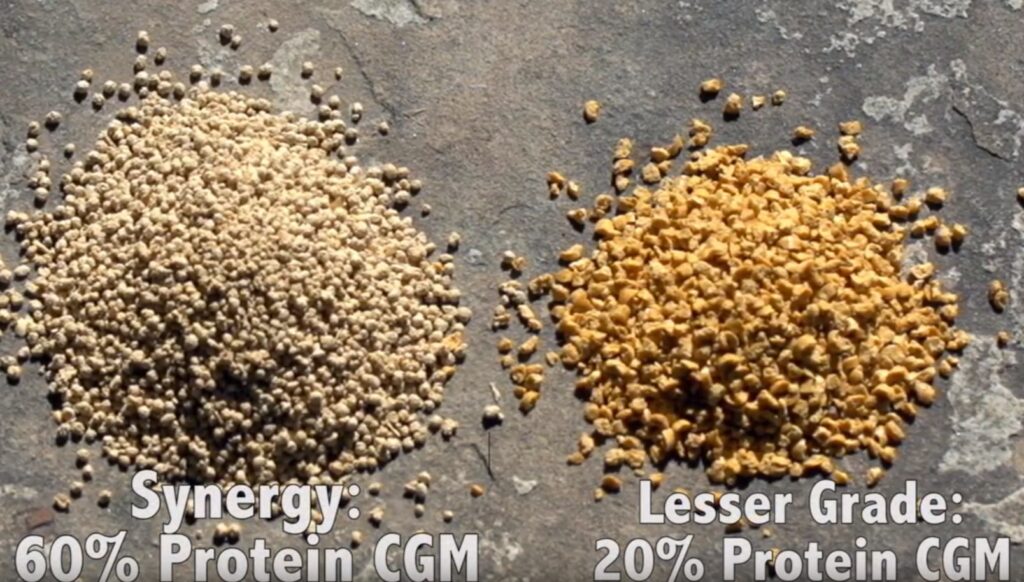ORGANIC LAWN FERTILIZER SERVICE
Organic Lawn Care vs Chemical Lawn Care
Organo-Lawn’s Approach vs Chemical Approach to Lawn Care?
Chemical Company Approach
Feed the grass with nitrogen, phosphorous, and potassium and ignore the soil.
Organo-Lawn’s Approach
Feed the soil to build a healthy microbial population, and the soil will feed the grass.
Build a Living Soil
At Organo-Lawn, we believe that a healthy soil creates a healthy lawn. Our focus is on enriching the soil to nourish the grass naturally. We utilize organic lawn fertilizers specifically designed to stimulate beneficial microbial activity in the soil using plant-based products.
Organic Lawn Fertilizer Service

Chemical Fertilizers Kill Soil Microbes
In contrast, chemical lawn care companies prioritize feeding the grass while ignoring the soil’s health. They often apply synthetic or salt-based nitrogen fertilizers like ammonium nitrate or urea. While lawns treated with these chemical fertilizers may appear green and healthy initially, this approach only provides short-term benefits to the grass and neglects the underlying soil health. Over time, the use of chemical fertilizers and pesticides damages the soil and creates a dependency on constant applications of synthetic nitrogen.
Lawns Become Addicted to Chemical Treatments
If a chemical lawn care company halts its treatments, the lawn can suffer, becoming pale and weak. After a year or more of this treatment, the beneficial microbes in the soil can die off, leading to issues such as fungal infections, including necrotic ring spot.
Reclaiming a Chemically Dependent Lawn
At Organo-Lawn, we frequently help reclaim lawns that have become chemically dependent. This process typically takes 1 to 2 years, as it requires time to reestablish beneficial microbial activity in the soil.
What is the Process?
We begin by adjusting lawn watering practices to follow the 1-2-3-2-1 watering technique. Next, we rebuild the soil using organic lawn fertilizers such as Synergy with Corn Gluten meal, Liquid Synergy, and One Earth Weed Control. Additionally, services like core aeration and compost top dressing can significantly improve the recovery time for the soil. We highly recommend these services for lawns that have become chemically dependent.
Chemical Fertilizer
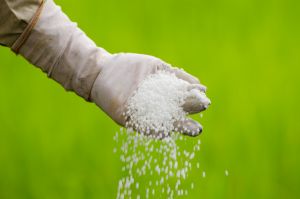
Thatch Accumulation and Chemicals
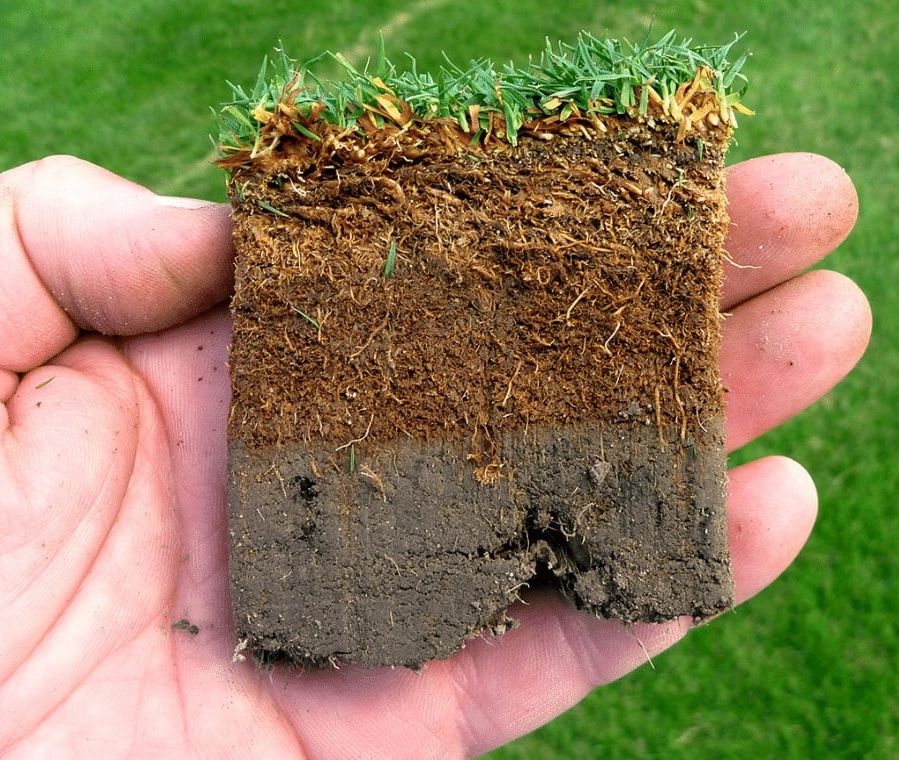
Organic Fertilizers Build Soil Health
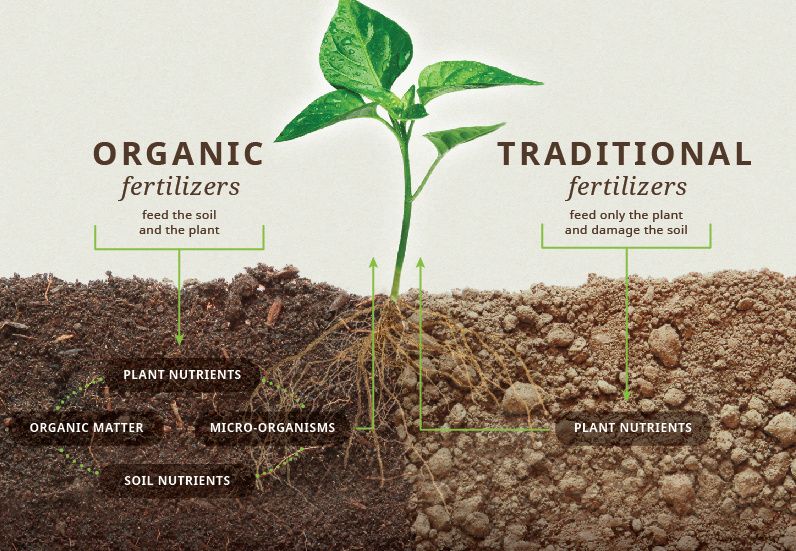
ORGANIC FERTILIZERS FOR LAWNS
Pax Terra Plus for Lawns
Pax Terra Plus is a premium 100% organic lawn fertilizer custom blended by Organo-Lawn for the soils of Colorado. Pax Terra Plus is designed to foster overall turf health, stimulate deep digging grass roots, and to promote beneficial microbial activity in Colorado soils.
Pax Terra Plus is non-burning, non-staining, non-toxic, low-odorous, and contains no heavy metals or unessential elements. Pax Terra Plus is comprised of premium organic fertilizer compounds that will provide a steady slow release of nutrients for the optimum development of roots without generating excessive top growth. Pax Terra Plus is a natural lawn fertilizer that can be used any time of year but we recommend using it for lawns in Boulder and Fort Collins as an all-organic lawn winterizer.
Organic Fertilizer N-P-K Analysis:
Total Nitrogen (N)………………….6%
Soluble Nitrogen…………………….0%
Insoluble Nitrogen………………….6%
Available Phosphate (P2O5)…….2%
Soluble Potash (K2O)………………2%
DERIVED FROM: Corn Gluten Meal, Bone Meal, Sulfate of Potash and Molasses
Pax Terra Plus - Organic Fertilizer
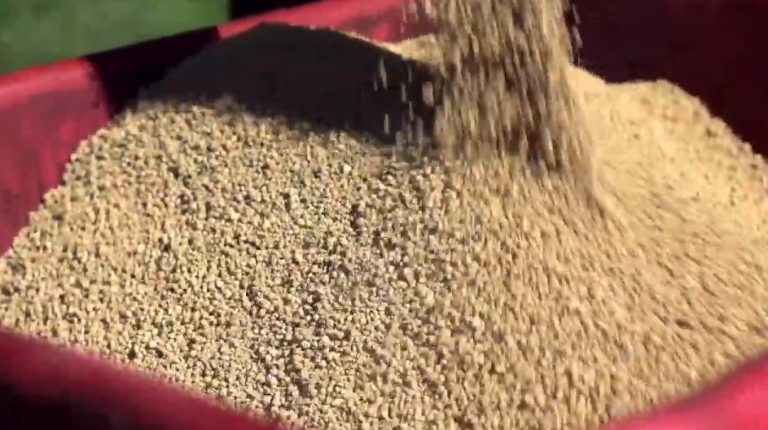
Corn Gluten Meal as an Organic Fertilizer
Synergy with Corn Gluten Meal
Synergy features corn gluten meal, a powerful and approved organic weed control that is entirely edible. But that’s not all—this remarkable ingredient doubles as an excellent organic fertilizer. With its 100% organic, slow-release nitrogen, Synergy ensures a vibrant and enduring green-up for your turf grass. As one of the top organic fertilizers on the market, it can be applied at any time throughout the year. Plus, you can have peace of mind knowing that Synergy is non-toxic to people, pets, and the environment. Transform your lawn with Synergy today!
DERIVED FROM: Corn Gluten Meal, Bone Meal, and Sulphate of Potash.
Does Corn Gluten Meal Work?
Compost Tea
Organic Compost Teas for Lawns
MDS Super Compost Tea
MDS is an exceptional organic fertilizer and compost tea used in all One Earth Weed Control applications. It is extracted from plant tissue and enhances the activity of microorganisms and beneficial bacteria in the soil. MDS Super Compost Tea differs from traditional lawn care compost teas by stimulating about ten times the beneficial microorganism activity. Additionally, it includes a natural lawn fertilizer designed to sustain the microbes after they have been applied to the lawn. In addition to promoting beneficial microbial activity in the soil, MDS Super Compost Tea and the natural lawn fertilizer contribute to new root development, resulting in a thicker lawn.
Thatch Reduction
They also help reduce thatch buildup and prevent lawn fungus and disease invasions. Scientific studies have proven that compost tea applications stimulate beneficial microbial activity in the soil. When the soil is rich in active microorganisms and beneficial bacteria, it becomes stronger and more drought-tolerant. Moreover, the presence of these microbes significantly reduces lawn fungus and weed problems. MDS Super Compost Tea is an integral part of all One Earth Weed Control applications. If you would like to receive MDS Super Compost Tea for your lawn in the Boulder or Fort Collins area, please contact our office to schedule an appointment.
DERIVED FROM: Liquefied Plant Materials, Calcium Lignin Sulfate, and Humate.
Compost Tea

Get Started with Organics!
Boulder (303) 499-2000
Fort Collins (970) 225-9425
Organic Lawn Fertilzer Service FAQs
When is the Best Time of Year to Apply Organic Fertilizer?
Organic Fertilizers Do Not Burn a Lawn
Applying organic lawn fertilizers can be beneficial throughout the entire year. Unlike synthetic options, authentic organic fertilizers contain nitrogen in a natural form that relies on microbial activity in the soil to become available to plants. This means that genuine organic fertilizers will not burn your lawn, even with higher application rates.
Our Weed Control Services Include Organic Fertilizer
At Organo-Lawn, we ensure that every weed control service includes organic fertilizer for optimal results. Our lawn care treatments are scheduled every 6 to 8 weeks to keep your lawn healthy and thriving. Thanks to our slow-release organic fertilizer, you can rest easy knowing it won’t harm your grass. We kick off our applications of Synergy with corn gluten meal, in March and finish up with our final treatment in October.
Organic Fertilizers Build Soils
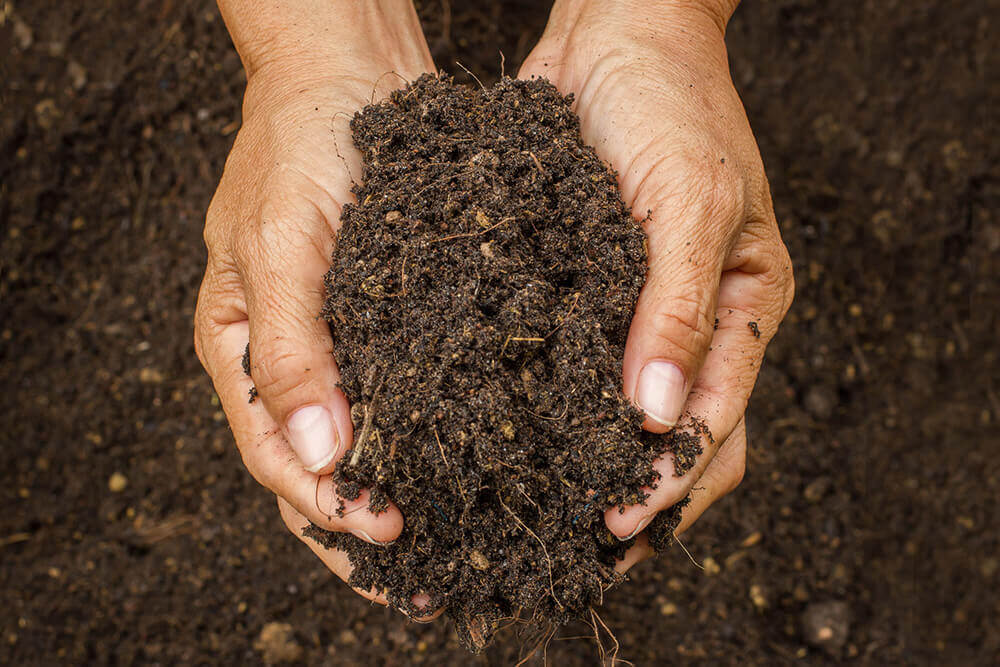
Is Corn Gluten Meal Safe for Children?
Department of Ag Rules
The Colorado Department of Agriculture prohibits us from claiming that a weed control product is safe, even if it is made from food-grade ingredients. However, we can assert that corn gluten meal serves as a natural fertilizer and a chemical-free weed control option that is non-toxic to people, pets, and the environment. We take pride in stating that all the ingredients in our Synergy with Corn Gluten Meal Fertilizer are considered edible. Synergy is the first application of the year in our Ultimate Program.
Kids and Pets

FAQs for Organic Fertilizers Continued
If the organic fertilizer is 100% organic and slow-release, it will not harm a lawn. This is because organic nitrogen is only accessible to plants when beneficial microbes break down the fertilizer and release the nitrogen into the soil. As a result, genuine organic fertilizers provide a natural source of slow-release nitrogen, ensuring that the nitrogen is never released in quantities sufficient to damage the lawn.
The choice between organic and chemical fertilizers depends on specific gardening goals, environmental considerations, and soil health needs. Here’s a clear comparison to help you decide which option is better for your situation:
Organic Fertilizers
Advantages:
Soil Health: Organic fertilizers improve soil structure and promote microbial activity, enhancing long-term fertility.
Eco-Friendly: They are biodegradable and reduce the risk of chemical runoff into water bodies.
Sustainable: Derived from natural sources like compost, manure, corn gluten meal, and bone meal, they help recycle organic waste.
Slow Release: Nutrients are released gradually as microbes break them down, virtually eliminating the risk of nitrogen burn.
Disadvantages:
Lower Nutrient Concentration: Higher application rates may be required to meet plant needs, which can be more expensive.
Slower Results: Nutrient availability depends on microbial activity, which can take longer to show effects on plant growth.
Chemical Fertilizers
Advantages:
High Nutrient Content: They can be precisely formulated to deliver specific nutrients in high concentrations.
Immediate Results: Nutrients are quickly available to plants, making them ideal for rapidly correcting deficiencies.
Convenience: They are easy to transport, store, and apply.
Disadvantages:
Soil Degradation: Long-term use can harm soil structure and damage microbial activity.
Runoff Risks: Excessive use can lead to pollution of water sources and harm ecosystems.
Dependency: Overuse may create reliance on external inputs, resulting in a decline in natural soil fertility.
Conclusion
Organic fertilizers are generally better for long-term soil health, sustainability, and environmental impact. Chemical fertilizers are effective for quick, targeted nutrient delivery but may pose risks if used improperly or excessively.
Many lawn care companies use fertilizers that are primarily composed of water-soluble nitrogen. These fertilizers make nutrients readily available to the plants, resulting in a quick greening effect on the lawn. However, they require frequent applications to maintain that lush green color, akin to giving the lawn a quick boost, but not a lasting solution.
In contrast, our nitrogen source is water-insoluble. This means it releases nutrients slowly, as beneficial microbes in the soil break it down. As a result, the lawn stays green for a longer period, which is healthier for the grass overall. Additionally, organic fertilizers stimulate microbial activity, which can help prevent fungal invasions and aid in decomposing thatch.
Our fertilizers also contain 0.5% humate, which helps to reduce water requirements and naturally unlock unavailable nutrients in the soil through a process called chelation. This makes these nutrients accessible for plant uptake.
Eighty-two percent of the nitrogen in Richlawn’s fertilizer is sourced from ammonium nitrate, which is classified as an inorganic nitrogen source. While Colorado law designates Richlawn’s fertilizer as synthetic rather than organic or organic-based, it’s important to note that our products still meet the standards for natural organic certification.
Here’s a comparison between 100% organic fertilizer and a bag of Scotts synthetic fertilizer to help you understand their differences and benefits:
- Ingredients
- Organic Fertilizer:
- Made from natural materials like corn gluten meal, sulfate of potash, molasses.
- Provides nutrients slowly as organic matter breaks down in the soil.
- Typically lacks chemical additives.
- Scotts Fertilizer:
- Contains synthetic chemical compounds designed for immediate nutrient availability.
- May include nitrogen, phosphorus, potassium, and proprietary additives for quick green-up.
- Nutrient Release
- Organic Fertilizer:
- Releases nutrients slowly, supporting long-term soil health.
- Depends on soil microbes and temperature for nutrient availability.
- Less likely to cause nutrient burn due to slow release.
- Scotts Fertilizer:
- Delivers nutrients quickly for immediate results (e.g., greener grass in days).
- Synthetic formulation may lead to over-application and nutrient runoff if not applied properly.
- Soil Health
- Organic Fertilizer:
- Improves soil structure and increases microbial activity.
- Adds organic matter that supports long-term soil fertility.
- Enhances water retention and aeration.
- Scotts Fertilizer:
- Primarily feeds plants rather than improving the soil.
- Repeated use can deplete organic matter over time if not supplemented with organic amendments.
- Environmental Impact
- Organic Fertilizer:
- Minimal risk of water pollution or chemical runoff.
- Eco-friendly
- Lower carbon footprint in production.
- Scotts Fertilizer:
- Risk of nutrient runoff into waterways, contributing to algal blooms.
- Contains chemicals that may affect soil microbial balance.
- Often relies on energy-intensive production processes.
- Ease of Use
- Organic Fertilizer:
- Requires proper application to match nutrient needs; results take longer to show.
- Heavier and bulkier to apply (e.g., compost).
- May have an odor due to natural ingredients.
- Scotts Fertilizer:
- Easy to apply with clear instructions and measured dosing.
- Fast-acting results with less effort.
- No significant odor or mess.
- Cost
- Organic Fertilizer:
- Often more expensive upfront per pound.
- Long-term benefits reduce the need for frequent applications.
- Scotts Fertilizer:
- Generally less expensive upfront but may require repeated applications throughout the season.
- Suitability
- Organic Fertilizer:
- Ideal for sustainable gardening and improving soil health.
- Preferred for organic-certified farms and gardens.
- Supports eco-conscious lawn care.
- Scotts Fertilizer:
- Suited for quick fixes and maintaining a picture-perfect lawn.
- Works well for homeowners seeking immediate results.
Summary
Feature | Organic Fertilizer | Scotts Fertilizer |
Source | Natural (compost, manure) | Synthetic chemicals |
Nutrient Release | Slow, long-term | Fast, immediate |
Soil Health | Improves soil structure | Focuses on plants, not soil |
Environmental Impact | Low pollution risk | Higher runoff risk |
Ease of Use | Requires more effort | Convenient, quick |
Cost | Higher upfront, long-term gains | Lower upfront, frequent use |
For a sustainable, soil-friendly lawn, organic is the way to go. For quick results and less effort, Scotts is effective but may require soil care over time.
This statement applies to water-soluble nitrogen products; however, our products use insoluble nitrogen sources that will not burn a lawn. In fact, we believe that lawns require fertilizer during the summer due to the increased stress caused by excessive heat. Additionally, we incorporate more humate and yucca extract into our fertilizers in the summer. Both yucca and humate enhance the lawn’s ability to combat heat and drought stress.
A winterizer is an exceptional organic lawn fertilizer designed to nourish your lawn throughout the winter months. It protects root structures and ensures your grass springs back to life quickly and vibrantly in the spring. Give your lawn the boost it needs to thrive!
The winterizer treatment is widely recognized as the most crucial lawn care practice of the year. When lawns are untreated in the fall, they face a staggering tenfold increase in the risk of diseases, experience 20% more weed growth, and produce 10% less chlorophyll. By applying a winterizer, you ensure your lawn remains healthy and vibrant, avoiding these detrimental effects.
No, these numbers do not indicate better or worse; instead, they represent the ratio for applying fertilizer.
For example, if you have a bag of chemical fertilizer labeled 22-14-8 and you want to achieve a total application rate of 1 pound of nitrogen per 1,000 square feet, you should apply 4.5 pounds per 1,000 square feet. This calculation works as follows: 4.5 pounds multiplied by 0.22 (the nitrogen percentage) equals approximately 0.99 pounds of nitrogen per 1,000 square feet.
In the case of a fertilizer with a 6-2-2 ratio, you would need to apply 17 pounds to achieve the desired nitrogen rate, as follows: 17 pounds multiplied by 0.06 (the nitrogen percentage) equals approximately 1.02 pounds of nitrogen per 1,000 square feet.
No, organic fertilizers typically can’t exceed a rating of 10. You may have bought an organic based product that actually contains a mix of organic and synthetic fertilizers.
Compost tea is a nutrient-rich liquid fertilizer created by steeping compost in water, often with aeration to promote beneficial microbial activity. This solution is packed with essential nutrients and helpful microorganisms that enhance soil health, support plant growth, and strengthen natural defenses against pests and diseases. It is an eco-friendly option that can be applied directly to plant leaves or poured into the soil to boost plant vitality.
Compost tea is ideal for gardens, lawns, and indoor plants, making it an excellent way to recycle organic matter and encourage sustainable gardening practices. A high-quality compost tea should contain a diverse range of beneficial microbes suitable for application on lawns, plants, and soils. When introduced to a new environment, compost tea brings valuable microbial activity. However, for these microbes to thrive, the new environment must provide adequate food, air, moisture, and warmth.
According to the Department of Agriculture, we cannot legally claim that any weed control method is completely safe. Additionally, they state that water is not considered safe either. However, we can assert that corn gluten meal is an organic weed control option that is non-toxic to people, pets, and the environment.
We take pride in the fact that all the ingredients in Synergy, which is made from corn gluten meal, are edible. Synergy is part of our green lawn care program, known as The Ultimate Program. Notably, corn gluten meal is also an ingredient found in many types of dog foods.
